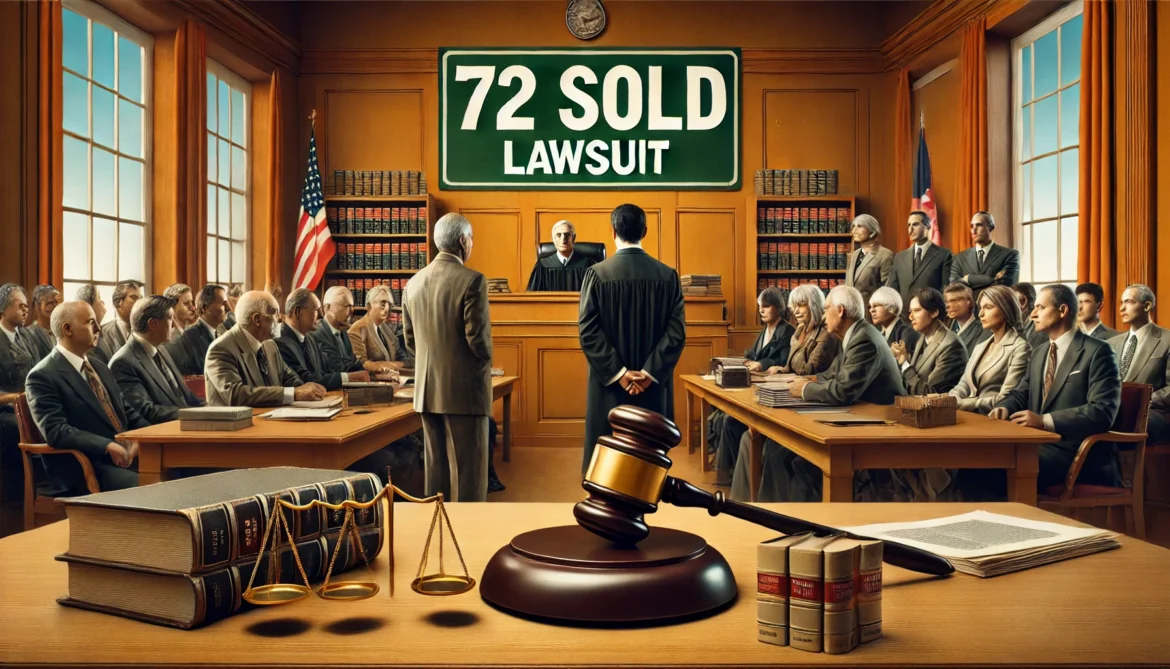
The real estate world has recently been buzzing with discussions surrounding the 72 Sold lawsuit. 72 Sold, a real estate sales program known for promising rapid home sales within 72 hours, has gained attention not only for its innovative approach but also for its legal challenges. Let’s dive into the details of the lawsuit, the parties involved, and what this means for the real estate market.
What is 72 Sold?
72 Sold is a real estate marketing strategy developed by Greg Hague, a well-known figure in the real estate industry. The program claims to sell homes in just 72 hours by using a proprietary selling process. It is marketed as a way to help homeowners sell quickly, without the need for long listing periods. The approach involves setting a specific price point and marketing homes in a condensed timeframe, making it highly appealing to sellers who need fast results.
The program’s widespread advertising and its promise of quick home sales made it highly popular, particularly in competitive real estate markets. However, it has also drawn scrutiny from both competitors and regulators, which has led to the emergence of legal disputes.
The Lawsuit
The 72 Sold lawsuit revolves around various complaints related to advertising practices, business tactics, and trademark infringement. While details vary depending on the parties involved, the core of the dispute often involves allegations of misleading advertising or claims that do not align with traditional real estate practices.
- Misleading Advertising Claims: Some competitors and consumer groups have filed lawsuits, arguing that the marketing claims made by 72 Sold lawsuit are exaggerated or misleading. Specifically, concerns have been raised that the program over-promises on how fast homes will sell and how much homeowners will ultimately make compared to traditional selling methods.
- Trademark and Business Practice Disputes: There are also cases where competitors in the real estate market have filed lawsuits related to the use of similar sales tactics or branding. These lawsuits argue that 72 Sold’s proprietary process is not unique and is, in fact, a repackaged version of traditional selling techniques, leading to accusations of unfair business practices.
- Consumer Complaints: Homeowners who have used the 72 Sold lawsuit program have also raised complaints that, while their homes were sold quickly, they did not receive the expected value or faced hidden fees that were not disclosed upfront. These complaints have led to additional scrutiny from consumer protection agencies.
Legal Implications and Impact on the Real Estate Market
The outcome of the 72 Sold lawsuit is expected to have broader implications for the real estate industry. If the courts rule against the company, it could lead to increased regulation of real estate marketing practices. This could result in stricter guidelines for companies that promise fast sales or use non-traditional methods to attract clients.
For consumers, the lawsuit serves as a reminder to thoroughly research any real estate program before signing up. While quick sales can be appealing, it’s essential to understand the fine print, fees, and potential trade-offs in terms of the final sale price of your home.
72 Sold Response
Greg Hague and 72 Sold lawsuit have defended their program, asserting that it provides a legitimate and effective alternative to traditional real estate methods. Hague has pointed to the program’s success rate and satisfied customers, dismissing the lawsuits as attempts by competitors to discredit an innovative approach.
In response to the legal challenges, 72 Sold has also made efforts to clarify its advertising and provide more transparency in its operations. By addressing the concerns raised in the lawsuits, the company aims to protect its reputation and continue offering its unique real estate solution.
Potential Outcomes of the 72 Sold Lawsuit
 The ongoing legal battles surrounding 72 Sold could lead to several potential outcomes, each with its implications for the company and the real estate industry at large. Here are some possible scenarios:
The ongoing legal battles surrounding 72 Sold could lead to several potential outcomes, each with its implications for the company and the real estate industry at large. Here are some possible scenarios:
- Settlement or Court Rulings: Like many legal disputes, the 72 Sold lawsuit could end in a settlement, where the company agrees to modify its practices or compensate affected parties without admitting wrongdoing. Alternatively, if the case goes to trial, a court ruling could either affirm or reject the allegations against 72 Sold. A ruling in favor of the plaintiffs could force the company to significantly alter its advertising methods, or even face financial penalties.
- Increased Regulation: If the lawsuit draws significant public and regulatory attention, it could lead to tighter industry standards. Real estate companies might be required to provide more transparency in their marketing materials, clearly outlining any potential risks or downsides to alternative selling models like 72 Sold. This could reshape the way real estate is advertised and practiced, creating a more stringent regulatory environment to protect consumers from potentially misleading claims.
- Impact on Alternative Real Estate Models: The outcome of the 72 Sold lawsuit may influence other non-traditional real estate models, such as iBuyer platforms (companies that make instant cash offers on homes) or flat-fee real estate services. If the court rules against 72 Sold, other alternative services might face similar scrutiny, forcing them to rethink their marketing strategies and business models to avoid legal challenges. On the other hand, if 72 Sold successfully defends itself, it could validate these alternative approaches and encourage even more innovation within the real estate space.
- Consumer Perception: One of the biggest risks 72 Sold lawsuit faces, regardless of the legal outcome, is the potential damage to its reputation. Even if the company is not found liable in court, the publicity surrounding the lawsuit could make prospective clients more cautious or skeptical of its promises. Rebuilding consumer trust would require 72 Sold to be more transparent and forthcoming in its communications, ensuring clients fully understand the benefits and limitations of the program.
- Competitor Reactions: Traditional real estate firms and agents, who have long criticized 72 Sold for disrupting the market, will be closely watching the lawsuit’s progression. If 72 Sold lawsuit is found to have used misleading or unfair practices, competitors may feel vindicated and could use the ruling to promote their services as more reliable or trustworthy. Conversely, a favorable outcome for 72 Sold might prompt competitors to adopt similar fast-selling strategies, sparking a new wave of competition in the real estate industry.
Lessons for Homeowners and Real Estate Buyers
For homeowners and buyers considering alternative real estate programs like 72 Sold lawsuit, the lawsuit provides valuable lessons. Here are a few tips for navigating the real estate market with greater awareness:
- Do Your Research: Before signing up for any real estate service, take the time to thoroughly research the company’s track record, reviews, and past performance. Look for third-party reviews and customer testimonials to gauge the experiences of others who have used the service. This can help you avoid any potential surprises down the road.
- Understand the Fine Print: Always read the terms and conditions carefully, especially when it comes to fees, commissions, and pricing structures. Make sure you understand how the company makes its money and whether any hidden costs could affect your final sale price.
- Set Realistic Expectations: Fast home sales may sound appealing, but they often come with trade-offs. In some cases, selling quickly could mean accepting a lower price than if you had gone through the traditional listing process. Be clear about your goals and make sure the program aligns with your needs.
- Consult a Real Estate Professional: If you’re unsure about whether a program like 72 Sold lawsuit is right for you, consider consulting with a real estate agent or attorney who can provide expert advice. They can help you weigh the pros and cons of various selling methods and ensure that you’re making an informed decision.
Final Thoughts
The 72 Sold lawsuit highlights the ongoing tension between innovation and regulation in the real estate market. While alternative selling models like 72 Sold Lawsuit offer convenience and speed, they also face significant challenges in maintaining transparency and trust with consumers. As the lawsuit continues to unfold, it will undoubtedly shape the future of real estate marketing, influencing how companies promote their services and how consumers approach the home-selling process.
For now, homeowners and buyers should stay vigilant, carefully evaluating any program or service that promises fast results. While speed can be a key factor in real estate, it’s essential to balance that with a thorough understanding of the trade-offs involved. In the ever-evolving world of real estate, knowledge remains one of the most powerful tools for navigating the market successfully.
Also Read: FastBackgroundCheck


